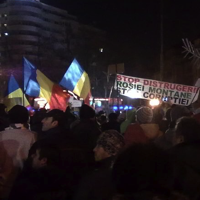With anti-government protests in Romania moving into their second week, demonstrators are showing a persistence unusual for this part of the world, underscoring the symbolic importance they have placed in calling attention to their widespread grievances. The woes that have brought Romanians to the streets -- low incomes, corruption and rising authoritarianism -- are familiar to many in Eastern Europe. Indeed, the protests, which according to police estimates brought 13,000 people to the streets across the country over the weekend, follow similar demonstrations in Russia and Hungary, leading some to suggest that this is the European incarnation of the Arab Spring.
Tensions initially boiled over in Bucharest, where cars were set alight, shops vandalized and missiles hurled at the police, who responded with tear gas. Hundreds of arrests and dozens of injuries have been reported.
Things had calmed by midweek, dampening any farfetched expectations of a sustained uprising. But approximately 1,000 people continued to rally in the center of the capital every evening, threatening to stay until the government of President Traian Basescu and his ally, Prime Minister Emil Boc, stood down.

